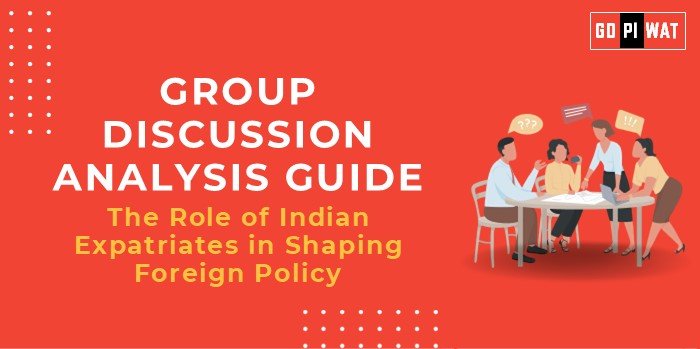📋 Group Discussion (GD) Analysis Guide
🌟 The Role of Indian Expatriates in Shaping Foreign Policy
🌐 Introduction to the Topic
Opening Context: With over 32 million Indian expatriates spread across the globe, India boasts the largest diaspora in the world. This demographic serves as a vital force in soft power diplomacy, economic growth, and bilateral ties, making it a critical component of India’s foreign policy strategy.
Topic Background: Indian expatriates have historically contributed to India’s global stature. From financial remittances (USD 111 billion in 2023) to influencing policies in countries like the US and the Gulf, their presence plays a pivotal role in shaping geopolitical and economic engagements.
📊 Quick Facts and Key Statistics
- 🌍 Diaspora Size: 32 million Indians globally (MEA, 2023).
- 💰 Remittances: India leads globally with USD 111 billion remitted in 2023 (World Bank).
- 🌐 Representation: 4 Indian-origin leaders currently head governments globally.
- 📈 Business Impact: Indian diaspora businesses contribute USD 1 trillion to global GDP.
👥 Stakeholders and Their Roles
- 🇮🇳 Indian Government: Engages through programs like PBD (Pravasi Bharatiya Divas) and OCI (Overseas Citizenship of India).
- 🌎 Expatriates: Act as cultural ambassadors, political lobbyists, and investors.
- 🌏 Host Nations: Benefit economically and socially from Indian communities.
- 🏛️ Global Organizations: Facilitate diasporic engagements through international platforms like IOM (International Organization for Migration).
🏆 Achievements and Challenges
- 🎯 Achievements:
- Economic Influence: Indian remittances account for 15% of global inflows.
- Cultural Diplomacy: Bollywood and yoga amplify India’s soft power abroad.
- Political Clout: Indian-origin leaders foster bilateral ties.
- Startup Ecosystem: Diaspora-led investments fuel initiatives like “Startup India.”
- ⚠️ Challenges:
- Identity Politics: Rising xenophobia impacts expatriates’ welfare.
- Integration Issues: Assimilation in host countries remains a concern.
- Policy Coordination: Balancing host-country policies with Indian interests.
🌍 Global Comparisons
- 🇨🇳 China: The Chinese diaspora wields significant influence in Africa through trade.
- 🇵🇭 Philippines: Its expatriates, primarily in healthcare, are pivotal to foreign policy.
Case Studies:
- 🏙️ UAE: Indian workforce strengthens Indo-Gulf ties.
- 🇺🇸 USA: Tech professionals and students drive innovation and advocacy for stronger bilateral relations.
📋 Structured Arguments for Discussion
- ✔️ Supporting Stance: “The Indian diaspora is a strategic asset, influencing policies in host countries and contributing USD 111 billion annually to India.”
- ❌ Opposing Stance: “While economically significant, reliance on expatriates risks neglecting domestic capacity building.”
- ⚖️ Balanced Perspective: “The Indian diaspora strengthens India’s foreign policy but requires better integration and support mechanisms.”
🛠️ Effective Discussion Approaches
- 🔍 Opening Approaches:
- Quote relevant data: “Indian expatriates remitted USD 111 billion in 2023, showcasing their economic impact.”
- Reference a case study: “Indian tech professionals have shaped US policies on H-1B visas.”
- 💬 Counter-Argument Handling:
- “While expatriates face challenges, initiatives like PBD foster closer ties.”
- “Assimilation concerns can be addressed through bilateral agreements.”
📈 Strategic Analysis of Strengths and Weaknesses
- 🟢 Strengths: Global influence, remittances, soft power.
- 🟡 Weaknesses: Identity politics, integration challenges.
- 🔵 Opportunities: Diaspora diplomacy, economic collaborations.
- 🔴 Threats: Protectionist policies, xenophobia.
📚 Connecting with B-School Applications
- 🌏 Real-World Applications: Exploring diaspora-driven trade, innovation, and policies for projects.
- 🤔 Sample Interview Questions:
- “How can India harness its diaspora for economic growth?”
- “What role does the Indian diaspora play in soft power diplomacy?”
- 💡 Insights for Students:
- Opportunities in global trade, cross-cultural management, and international relations.


